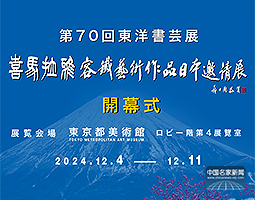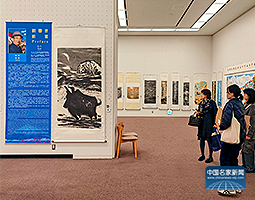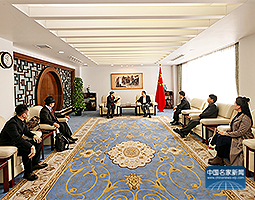The “Japan Hanhe Theater Society” established by Chinese expats in Japan to promote the development of Chinese culture in Japan
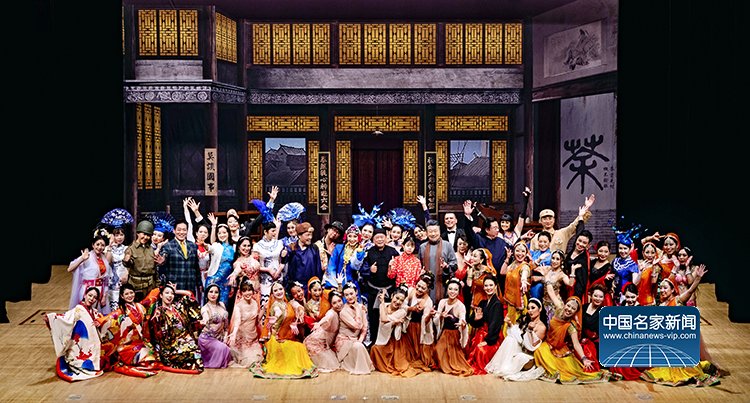
On April 28, as part of the commemorative events for the 45th anniversary of the signing of the China-Japan Treaty of Peace and Friendship, the new theater play, Teahouse Plus, jointly sponsored by the All-Japan Federation of Overseas Chinese Associations (general corporation legal person), Japan-China Dancers Federation, Chinese Cultural Arts Center, and Japan Ink Art Association, and supported by Cultural Division of the Chinese Embassy in Japan, China Cultural Center, Association of Chinese Enterprises in Japan, Japan-China Friendship Association (public corporation legal person), Japan-China Society (general corporation legal person), Chinese Culture People magazine, China Educational Channels, Chinese Culture Figures Network, chinesenew-vip.com, International Golden Knot Association, Chubun, Japan-China Business News, @Fang Jie Ai Shuo, Living in Japan Network, and East-Asian Information Network, was staged at Kameari Lirio Hall, receiving unprecedented praise and popularity.
Reported by Su Qing from the Chinese Culture Figures Network
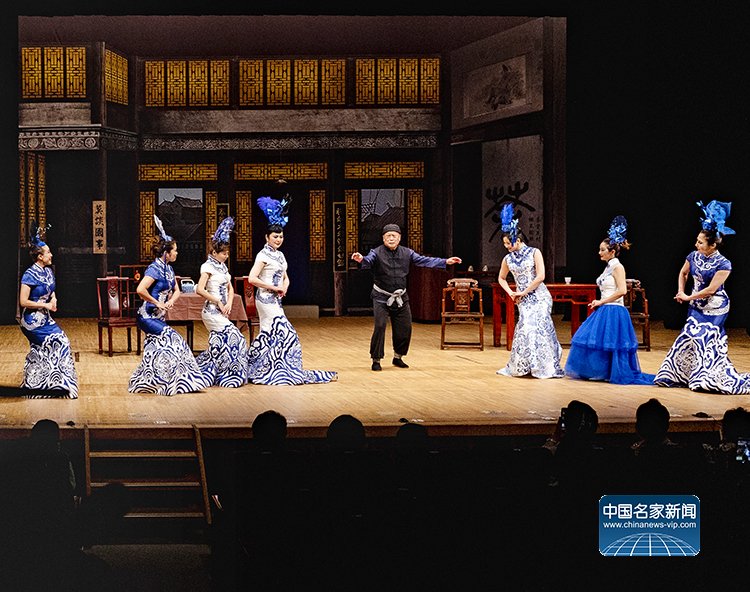
Teahouse Plus is a different kind of teahouse. When a Chinese Blue and White Porcelain mannequin walked into the Old Yutai Teahouse, the teahouse owner (played by Cheng Bo) asked in a loud voice looking bewildered: “Girls, who told you to come here? What is happening here?”
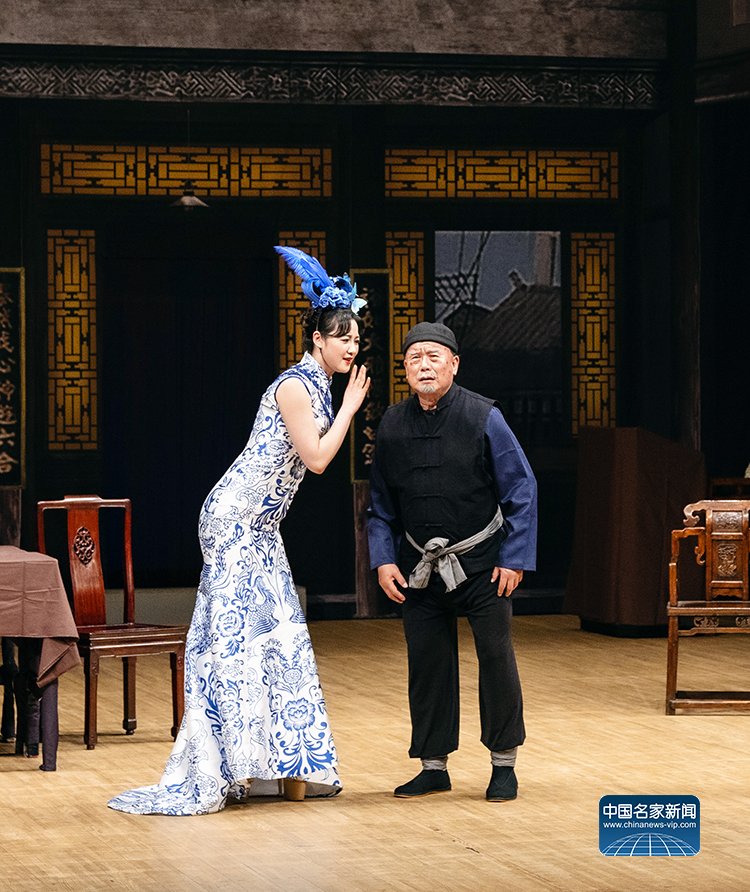
Xiao Dingbao kindly informed Mr. Wang the teahouse owner: “You must be careful. Xiao Liumazi is up to no good. He’s going to force you out of your teahouse......”
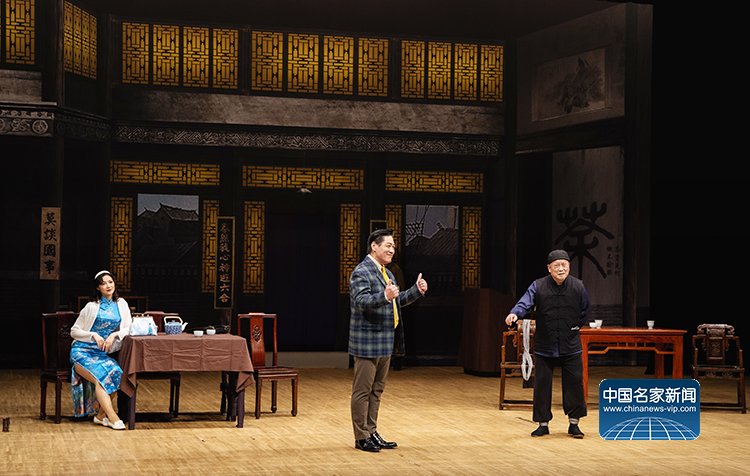
Xiao Liumazi brought Xiao Dingbao with him and threatened the teahouse owner: “Director Shen approved me to repair this teahouse. Move out of here and don’t give me any trouble!”
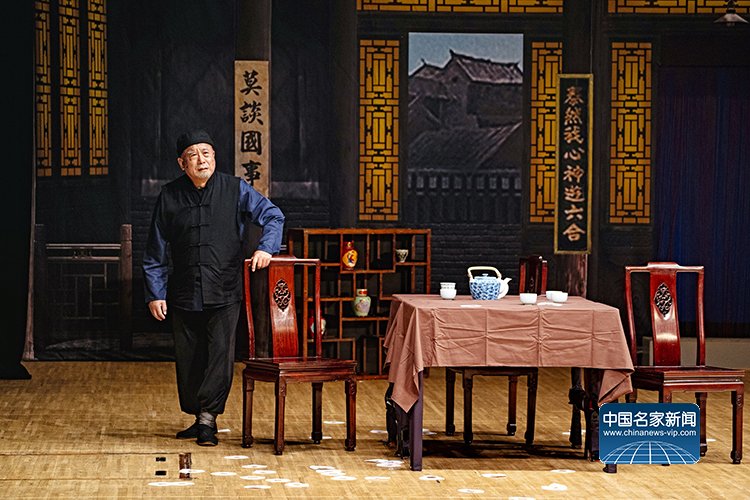
Teahouse owner: “This teahouse is mine. It’s where I live and where I’ll die.”
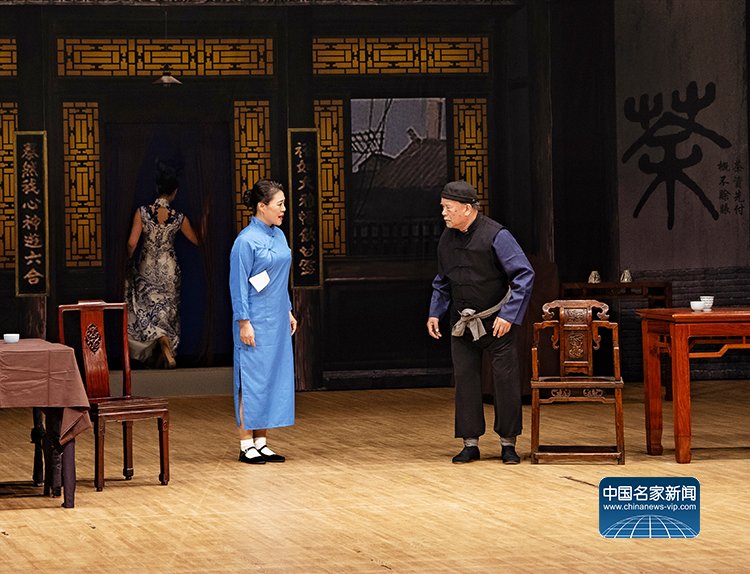
Daughter-in-law: “Dad! Xiao Hua and her father are both gone!”
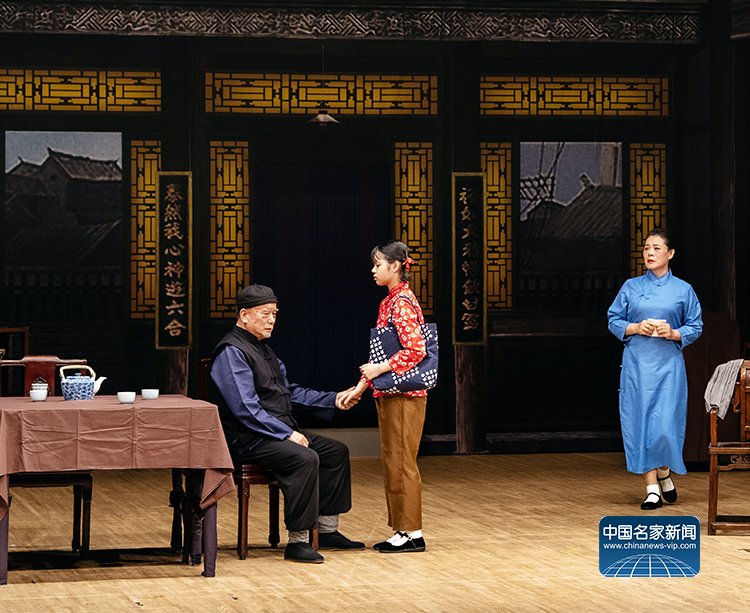
The old teahouse owner held his granddaughter, Xiao Hua’s hand and said emotionally: “Hua, tell your father that grandpa asked him not to come back!”
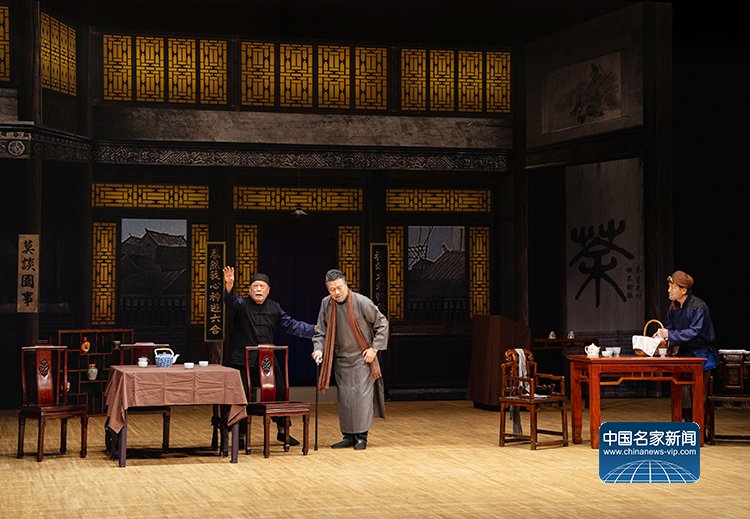
Mr. Wang the teahouse owner: “Erye! I was about to inform you! The teahouse is going to be renovated!
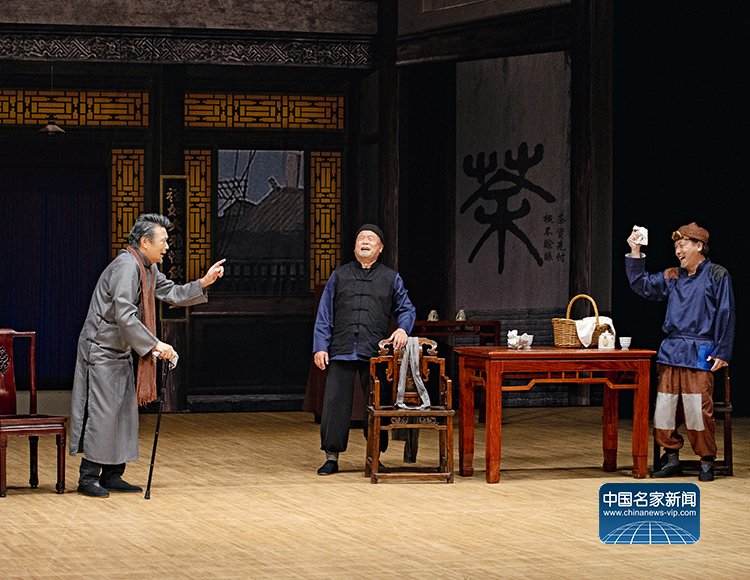
Chang Siye (played by Chen Zhouju): “Do you remember? You were being so sarcastic when I sold the bowl of noodles to that smuggler woman!”
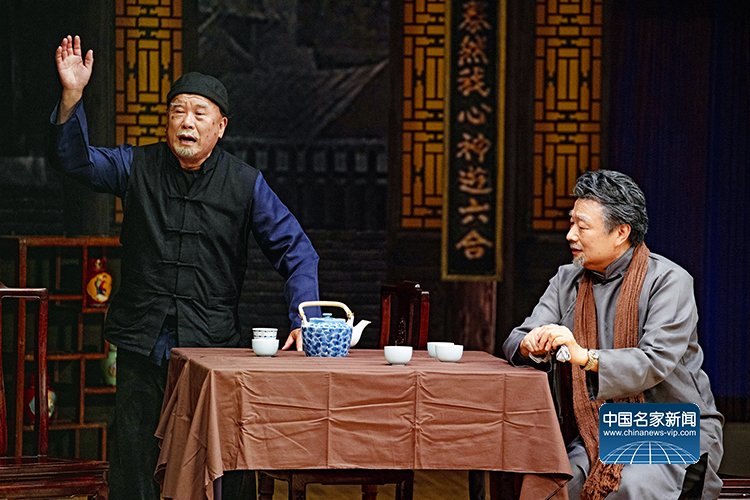
Mr. Wang the teahouse owner: “I have never forgotten about the renovation in my life. I have to live! Liu Maizi, Director Shen, and their despicable lot are living the good life. Why can’t we have wowotou as well? Whose idea was that?”
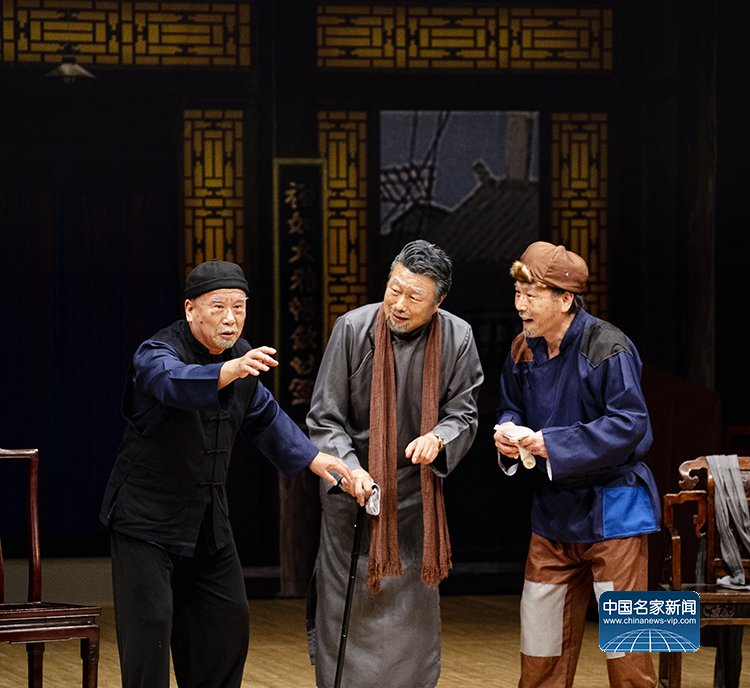
Mr. Wang the teahouse owner: “My brother! Let’s do it the old-fashioned way. Let’s shout out and drop some joss paper and mourn for ourselves!” (From left: Wang the Teahouse Owner played by Cheng Bo, Qin Erye played by Wang Zijiang, Chang Siye played by Chen Zhouju)

Mr. Wang the Teahouse Owner, Qin Erye (played by Wang Zijiang), and Chang Siye self-mockingly picked up the joss paper they threw for themselves to give vent to their resentment against and despair of the Kuomintang government......

The old teahouse owner was almost throttled by sorrow after the three old men bade farewell. He decided to die in resistance and took a belt and committed suicide......
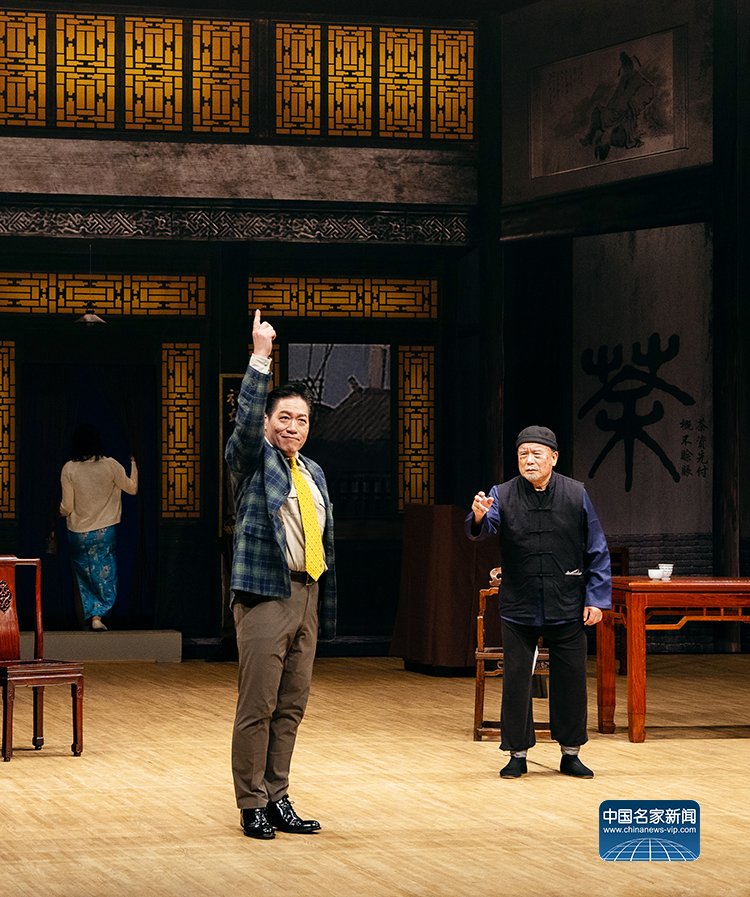
Xiao Liumazi told Mr. Wang smugly: “Old man, I’ll take over this place from now! Move out of here. I’m giving you a forewarning to save us all the trouble! Old Yutai will continue to sell tea during the day, and at night it will transform into a nightclub. I even invited some foreigners and celebrities to perform here. You just sit there and count your earnings Xiao Dingbao, and call in the dancers and celebrities. Let the old man and us all have a taste of the foreign dishes!” The old teahouse owner was at a loss and didn’t know what to do......The scene switched. Dancers entered the teahouse to perform a magnificent dance show......Teahouse Plus rolled into the dance section.

Argentinean Tango performed by Cesaru Marlena. Teahouse Plus is adapted from the Teahouse but different from the original play in that dance performances are added in between to present a novel stage mode.
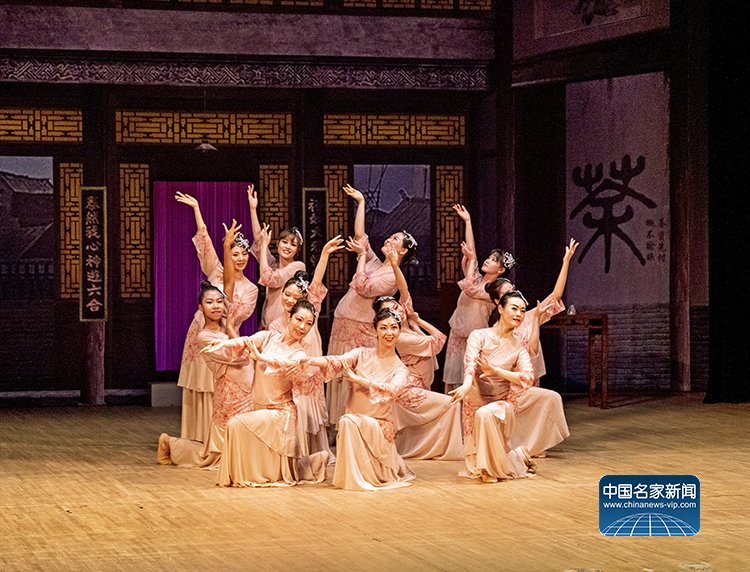
Peach Blossom, the Chinese classical dance performed by Huashi Art School
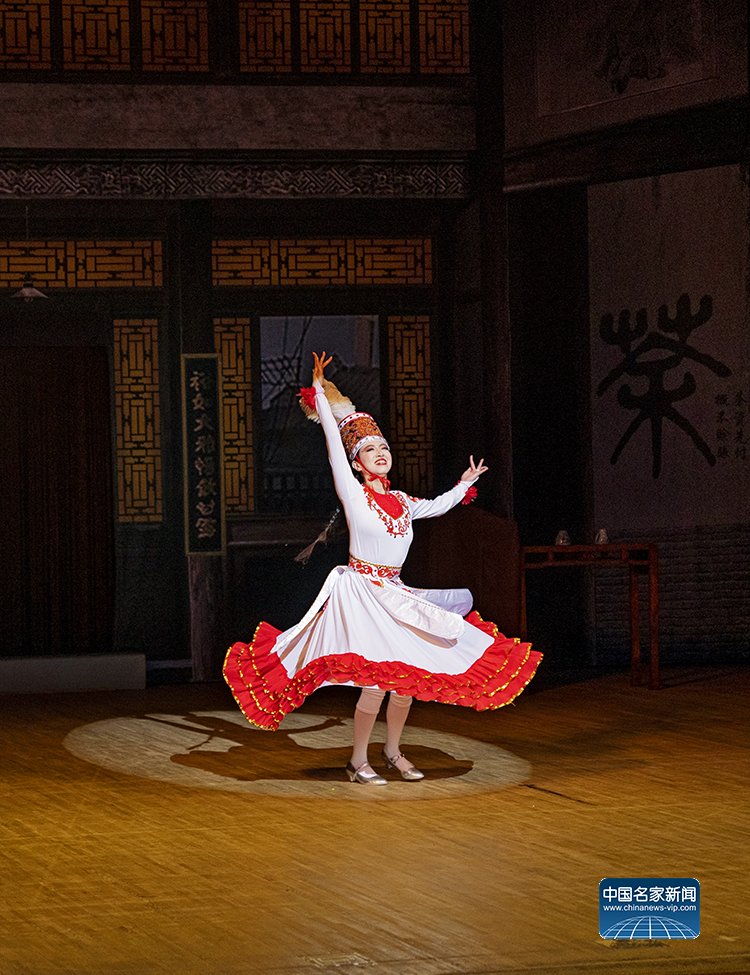
Flowers, the Xinjiang Kazakh dance performed by Yu Jianmei
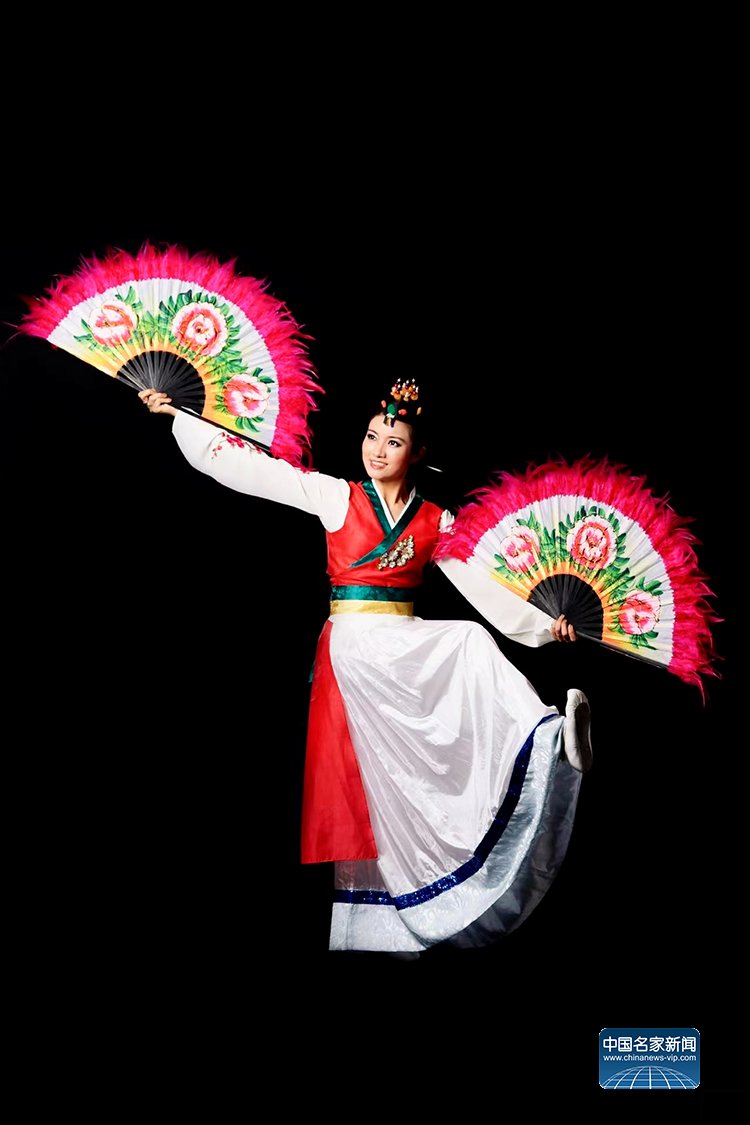
The Red Sun Shines on the Border, the Korean dance performed by An Yan
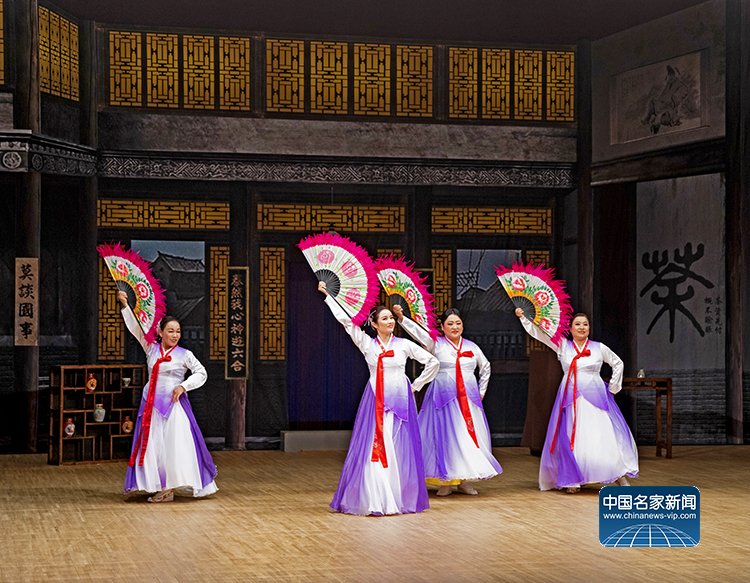
The inter-cut dance performances of Teahouse Plus were stunning and mind-blowing.
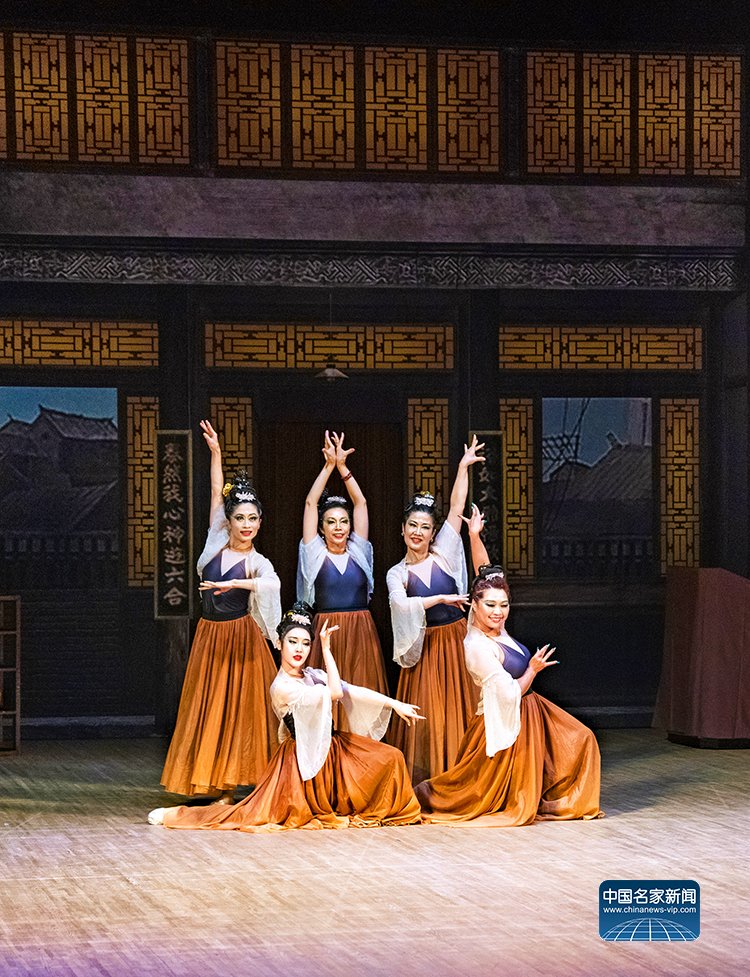
Meng Hua Lu, the Chinese classical dance performed by Xinxin Dance Troupe

You Are the Only One in My Heart, the modern dance performed by the Chinese and Western Dance Culture and Arts Society, led by Zhang Yi

Big Black Plums, the Indian Dance led by Xidong Youika

Sakura Dance, the Japanese dance performed by Xiaoteng Youjin

Arabian Belly Dance performed by Hengshan Meixiang, etc.
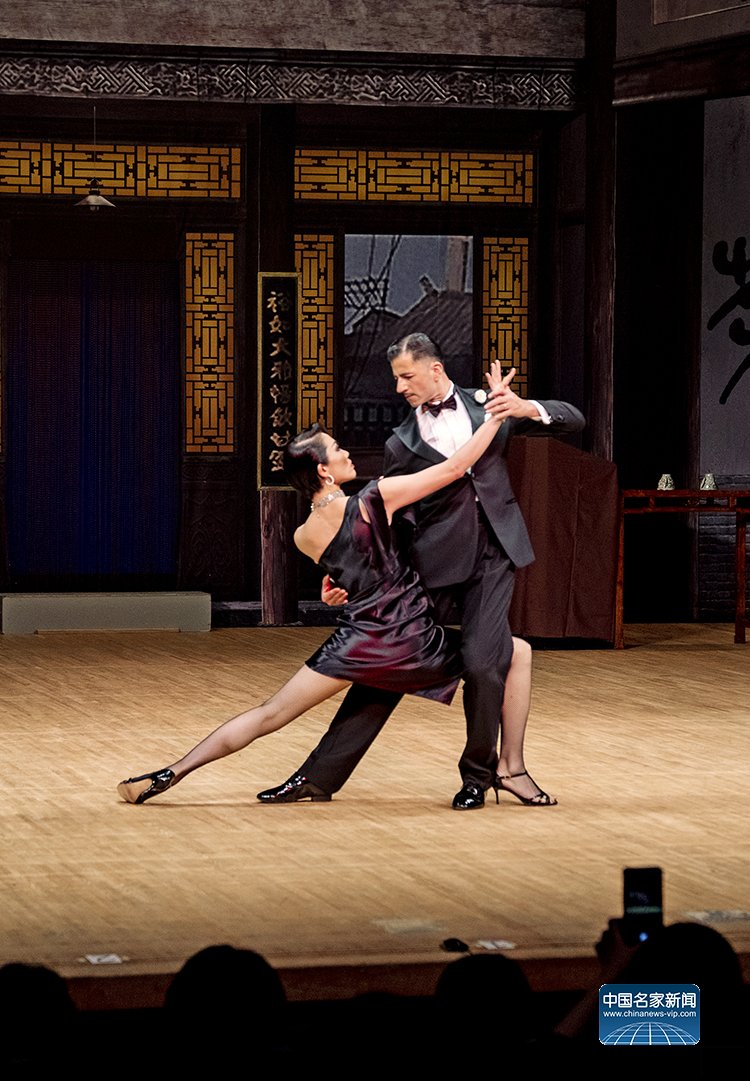
Argentinean Tango performed by Dani Aru and Mihouko

Light performed by the Chief Director of the play and famous dance artist and calligrapher Zhang Yi, and Zhao Chun who is known as the Prince of Chinese Ballroom Dancing was the most eye-catching dance of this play, receiving applause from the audience and bringing the play to another climax.
As part of the commemorative events for the 45th anniversary of the signing of the China-Japan Treaty of Peace and Friendship, the new theater play, Teahouse Plus, jointly sponsored by the All-Japan Federation of Overseas Chinese Associations (general corporation legal person), Japan-China Dancers Federation, Chinese Cultural Arts Center, and Japan Ink Art Association, and supported by Cultural Division of the Chinese Embassy in Japan, China Cultural Center, Association of Chinese Enterprises in Japan, Japan-China Friendship Association (public corporation legal person), Japan-China Society (general corporation legal person), Chinese Culture People magazine, China Educational Channels, Chinese Culture Figures Network, chinesenew-vip.com, International Golden Knot Association, Chubun, Japan-China Business News, @Fang Jie Ai Shuo, Living in Japan Network, and East-Asian Information Network, was staged at Kameari Lirio Hall on April 28, which was universally acclaimed by the Chinese expat community in Japan and the Japanese community.
The new stage play, Teahouse Plus, is adapted from the classic play of Beijing People’s Art Theater, Teahouse. The new play boldly adapted and recreated the third act of the original play. The brand-new stage content was presented through an exciting plot of twists and turns, surprising the audience and winning continuous applause.
The play began in the peddling shouts on the streets of old Beijing. The dimensional curtains and retro props that came into sight brought the audience back to an old teahouse in Beijing in the 1940s just before the Liberation......The Shu Lai Bao performed by the old and sorrowful Da Shayang immediately immerses you into the storyline......With the Chinese music starting to play, ten attractive female models dressed in Jing Tai Lan Qipao breezed in and rambled on the stage in elegant postures......Wang Lifa, the elderly owner of the Old Yutai Teahouse (played by Cheng Bo) opened the door and appeared on stage. He asked aloud looking stunned and confused: Oh my! Girls, who told you to come here? What is happening here?......Teahouse Plus was unpredictable yet clever and apt......Teahouse Plus was creatively humorous and logically reasonable and led the audience into the new “Teahouse” for a usual feast of spiritual enjoyment as the plot unfolded......The audience was caught by surprises as the lifelike characters came onto stage one after another.
The Teahouse is the epitome of the modern history of China. Beijing People’s Art Theater’s Teahouse is the creme de la creme in all the classic plays. The veteran artists Yu Shizhi, Lan Tianye, and Zheng Rong, known as leading figures in the drama, brought a quintessential performance to the unrivaled art classic. In Teahouse Plus, Cheng Bo, who plays Mr. Wang the Teahouse Owner, Wang Zijiang, who plays Qin Erye, and Chen Zhouju, who plays Chang Siye, knew how difficult the play could be. But the hearts and aspirations of the three “old boys” remained intact and unchanged, making them more determined to stand up to the challenges posed by this classic play.
Wang Zijiang, who plays Qin Erye, is born into an artistic family in Beijing. Influenced by his family from childhood, he is an accomplished Chinese landscape painter. He has been recommended by several seniors from the Chinese film and television industry and participated in some films and television series. Although he was admitted to the Beijing People’s Art Theater, he eventually chose to stick to his childhood love of painting and calligraphy. Currently, he serves as the Chairman of the Japan Ink Art Association and is a contracted Chinese painting lecturer at NHK. The hundred-meter ink murals created by him are collected by the Mobara Museum of Fine Arts, Chiba Prefecture, and world intangible cultural heritage sites Yakushiji Temple, Izumo-Taisha, and Himeji-jo. Over the years, he never gave up his pursuit of and practice of film and television art, recitation, and stage plays. This time, he finally realized his artistic dream and left a profound impression on the audience.
Chen Zhouju, who plays Chang Siye, is a senior Chinese expert and frequent Chinese lecturer at several Japanese universities who has abundant experience in the education and practice of the Chinese language. He loves poetry recitation and has published many excellent works. He is also a leading character of the Japanese Recitation Salon he established. His major breakthroughs in Teahouse Plus in terms of both his voice and physical performance were universally acclaimed by the audience.
In Teahouse Plus, Cheng Bo, who plays Mr. Wang the Teahouse Owner, left an impression of being positive and passionate. The versatile performance artist was admitted to the Opera Company of China National Opera & Dance Drama Theater in 1979. In 1982, he appeared in the grand performance, Song of the Chinese Revolution, where he led the chorus and performed a duet on the act of Bei Fa Guan Deng with Li Guyi and Li Yuanhua, receiving wide praise from various communities. He is a National Class I Actor and a member of the Chinese Musicians’ Association and China Theater Association. During his eight years at the Theater, the outstanding veteran tenor and performance artist appeared in the grand operas Save Her and the White-Haired Girl. After coming to Japan, he remained active on the stage of cultural art and appeared in a number of Japanese films and TV series including Children of the Earth produced by NHK in which he played Mr. Yang, head of the Chinese Government Delegation; and the film Sloppy Trading Company starring Kaori Momoi, Ken Watanabe, Tanaka Kunie, Tanaka Kaizo, and Satomi Kobayashi. He received the Award of the Japanese Foreign Minister, the Appreciation Award of the Japanese Justice Minister, and other honors. As the Chief Production Artistic Director, he was involved in the planning and production of the original operas, Yang Gui Fei and the Legend of Xu Fu, in which he played Qin Shi Huang. These countless artistic experiences greatly enriched Cheng Bo’s artistic background. Therefore, the role of the teahouse owner in Teahouse Plus was at his command. His penetrating and in-character performance was universally received.
The success of this play exceeded expectations. Apart from the fact that Teahouse is a classic in itself, the brilliant dances also played a crucial role. The Chief Director of the play, the renowned dancer and calligrapher Zhang Yi oversaw everything in person and in detail and arranged for dancers in Japan from various countries to appear on the stage of Kameari Lirio Hall at the same time. The enormous efforts and hard work he put into this play made created the miracle of Teahouse Plus with the entire cast.
In addition, Xiao Dingbao, played by the Japanese-Chinese mixed-race actress Moriyama Tomori, is worldly but beautiful and kind.
Yang Hailun, who plays Xiao Tangtiezui and Da Shayang is a typical Shandong man. Known as the Japanese Bearded Apollo, he shaved all his beard to get closer to his character. Although it was his first time performing a stage play in Japan, his creative approaches received a good stage effect.
Guo Bin, who plays Xiao Liumazi in Teahouse Plus, presented a vivid interpretation of the loathsome character.
You Lihong, who plays the daughter-in-law, is a successful antique dealer and low-key elite. Before coming to Japan, she was deputy director of CCTV’s Super Variety Show. Her acting is natural, smooth, simple, and unadorned, which is exactly how the daughter-in-law should be.
The lovely and adorable Wu Ruixi, who plays Xiao Hua, is also a starlet in the Chinese expat community. Her dreary outcry: “Grandpa! Goodbye!” on the stage was gut-wrenching and tear-jerking.
The Teahouse Plus ended in a rapturous Yangko dance. The elated audience gave a long-standing ovation and was reluctant to leave. The entire cast went on the stage for a curtain call. Cheng Bo made the official announcement to the audience that, to promote Chinese culture and further facilitate the cultural exchange between China and Japan, the “Japan Hanhe Theater Society” was officially established on April 28 as required and called for by the cast and society, and that they would present a classic stage play for the Chinese and Japanese audiences each year to enable Chinese culture to flourish in Japan
(Editors in charge: Zhang Yan, Liu Sheng)





























